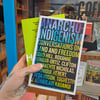Anarcho-Indigenism: Conversations on Land and Freedom

Edited by Francis Dupuis-Deri & Benjamin Pillet
'Vigorously affirming anarchism's plurality, the authors make a powerful case for the reconfiguration of anticolonial struggle' Ruth Kinna, Professor, Loughborough UniversityAs early as the end of the 19th century, anarchists such as Peter Kropotkin and Elisee Reclus became interested in indigenous peoples, many of whom they saw as societies without a state or private property, living a form of communism. Thinkers such as David Graeber and John Holloway have continued this tradition of engagement with the practices of indigenous societies and their politics. There has also been a long history of (often imperfect) collaboration between anarchists and indigenous activists, over land rights and environmental issues, including recent high-profile anti-pipeline campaigns.
Anarcho-Indigenism is a dialogue between anarchism and indigenous politics, featuring interviews from indigenous contributors Veronique Hebert, Gord Hill, Freda Huson, J. Kehaulani Kauanui, Clifton Ariwakehte Nicholas and Toghestiy, as well as the Marxist scholar specialist in indigenous people's history and politics, Roxanne Dunbar-Ortiz. The contributors reveal what indigenous thought and traditions and anarchism have in common, without denying the scars left by colonialism even within this anti-authoritarian movement.
They ultimately offer a vision of the world that combines anti-colonialism, feminism, ecology, anti-capitalism and anti-statism.
Softback book.
160 pages.
Published by Pluto Press.
